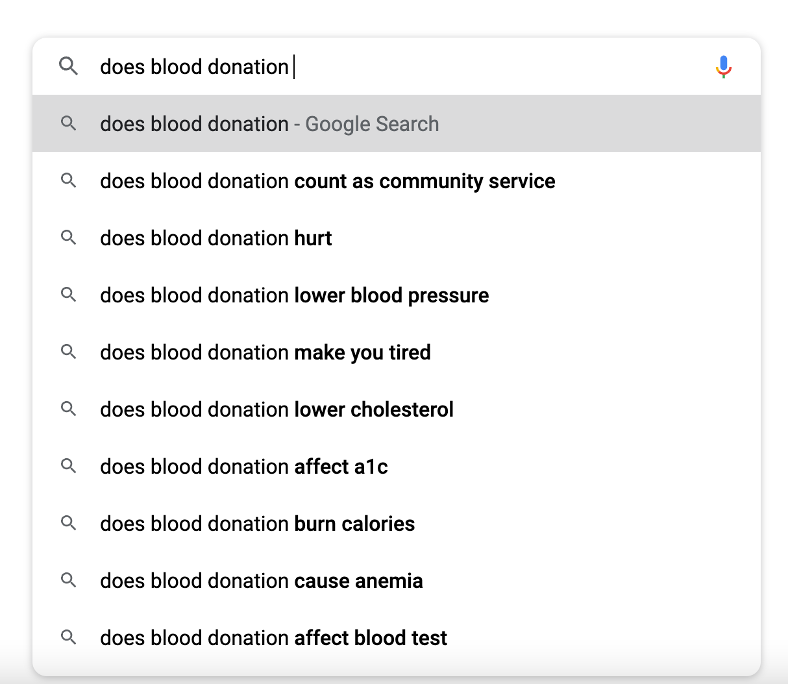
Most Commonly Googled Questions About Blood Donation — Answered by the Experts, Part 1
Have you ever turned to Google for help before a donation? Say, to find out how you could bulk up on iron, or to find out if your newfound cold would be cause for deferral? Or perhaps you asked Google a few questions before you made an appointment, to see if blood donation was right for you — whether it’s really effective, how much it hurts (which can be a daunting fear the first time), whether you’d feel tired after?
Whether you’ve directly contributed to Google’s database of questions or not, the truth is, blood donation is a very commonly searched topic. To help shed light on some of the most common inquiries and misconceptions around blood donation, we sat down with some of our SBC experts and asked them some of the most popular questions on the Internet about blood donation, as determined by the phrases Google uses to autocomplete the start to blood donation questions. For five weeks, we’re sharing answers to the top Googled questions in a few categories: “Can I donate blood…?”; “Does blood donation…?”; “How does blood donation…?”; “Are blood donations…?”; and “Do blood transfusions…?”
 This week, we’re covering the most commonly Googled questions beginning with “Does blood donation” as answered by SBC’s Medical Director, Dr. Tho Pham! All the questions we’ll be answering are in this article’s header image so feel free to browse for the ones you’re especially anxious to know down below, or test your knowledge against our expert!
This week, we’re covering the most commonly Googled questions beginning with “Does blood donation” as answered by SBC’s Medical Director, Dr. Tho Pham! All the questions we’ll be answering are in this article’s header image so feel free to browse for the ones you’re especially anxious to know down below, or test your knowledge against our expert!
Does blood donation count as community service?
If you’re trying to meet a requirement for a school or group you’re part of, we can’t guarantee that all organizations will qualify it that way… but, from our perspective, most definitely! Blood donors are generous with their time and with their health and are essential to the wellbeing of the community.
Does blood donation hurt?
While there’s always a chance of having a rare reaction, typically the only discomfort you’d experience is just a pinch when the needle is first inserted, and potentially a bit of arm soreness after donation (though that’s not as common). Beyond that, it’s largely pain-free!
Does blood donation lower blood pressure?
While this area is still being researched, the prevailing opinion right now is, yes! Regular donation in hypertensive individuals is believed to help reduce blood pressure. Giving blood decreases blood volume in your circulatory system (since you’ve just donated some of it!), thereby decreasing blood pressure and associated risks like forming blood clots.
Does blood donation make you tired?
Truthfully, it can for a brief period (usually just a day or a few days), particularly if you’re donating whole blood or red cells. When you donate blood, you temporarily reduce the overall amount of hemoglobin in your system. Hemoglobin helps bring oxygen throughout your body, including to the brain. And, if you tend to be on the lower side with hemoglobin already, this reduced oxygen flow overall, while not any serious health concern, can temporarily make you a bit more tired and out of breath than usual as your body works to quickly replenish your hemoglobin. This is where taking an iron supplement after donation and eating iron-rich foods makes a huge difference!
Does blood donation lower cholesterol?
Though blood donors have been recognized as having lower cholesterol as a group, more research is needed to determine whether blood donation is the cause of this trend.
Does blood donation affect A1C?
For those who aren’t familiar, Hemoglobin A1C is a type of diagnostic test that measures your blood sugar over the past three months. This test is used to assess risk of type 2 diabetes. Because blood donation impacts your overall blood volume, it can skew the results of an A1C test, so you should consult your doctor if you have a test scheduled and make sure you’ve waited the right number of days post-donation before taking the test.
Does blood donation burn calories?
Yes! Although, it’s not quite a “get fit quick” solution. According to research by UC San Diego, you can burn up to 650 calories per pint of blood donated as your body works to build back up your blood volume and create other blood components. Though this calorie burning takes place over the course of multiple weeks, we won’t bat an eye if you want to use it as an excuse to eat even more cookies in the canteen post-donation!
Does blood donation cause anemia?
While there are multiple kinds of anemia, the term is most commonly associated with low iron (which is what we’ll be referring to for this question). If you’ve donated before, you may remember having your finger pricked before donation to check your iron levels. Hopefully this wasn’t too memorable for you because you passed the test; but, if your iron is too low, per the FDA, you won’t be able to donate because taking out more iron when you’re already on the low side does put you at greater risk for anemia. So, in general, blood donation is designed in a way so that it decreases the chance of anemia by making sure those who donate have a healthy supply of iron already and donate with enough time between donations for their body to build back up iron levels. If you do feel tired for a while after donation, the good news is that replenishing iron levels for most people is as easy as taking a regular vitamin and eating iron-rich foods (which we should all really be doing, anyway!).
Does blood donation affect blood test?
The first thing to note is that you’ll receive some blood testing as a result of your donation. All blood donations are screened for a number of transfusion-transmitted diseases, such as HIV and hepatitis. (See the full list here.) If you test positive for any of these, we will remove your donated unit and notify you so you know to follow up with a doctor if needed. In general, though, if you’re planning on having a blood panel done by your physician, it’s best to wait after donating blood since certain levels, such as your hemoglobin, clotting factor, platelets and blood volume will be lowered for a brief period. Ask your doctor how long they’d like you to wait to get the most accurate results.
Read the rest of our Google Q&A series throughout the month on our blog.
